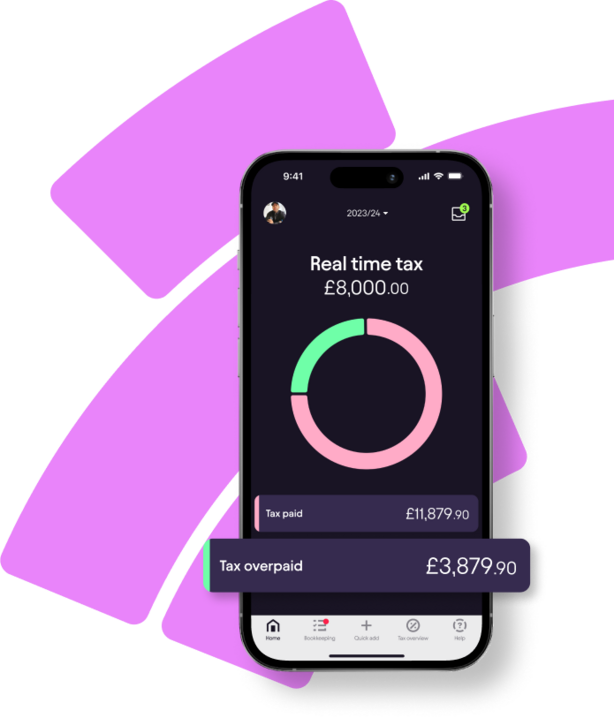Quickbooks is the best known accounting software on the market. It was launched in 1992 at a time when it had virtually no competition and so was able to establish something of a chokehold on the accounting software space. But while still wildly popular Quickbooks’ market dominance has taken a hit lately as an array of new feature-rich and more affordable accounting software options have emerged. In this post we’re going to take a look at several of the best Quickbooks alternatives, listing their features and pricing and noting both their upside and downside. First, here is a brief overview:
How is Pie different?
Pie is the only app for self assessment with tools for bookkeeping, your live tax figure, easy tax returns and helpful advice when you need it.
Save £168 per year vs Quickbooks, file your self assessment today for free with Pie
FREE
£69
+£59.99
£149
Quickbooks
£168
per year7 features
TaxScouts
£169
per year4 features
Accountant
£450
avg per year5 features
* Optional add on
#1: Pie
Pie is the leading alternative to QuickBooks, offering a host of important features, an easy-to-use interface, a modest learning curve and a very attractive price point. If you are the owner of a small to medium-sized business and you need cost-effective accounting software that won’t leave you scrambling to fill in the gaps in its feature set, Pie - being both a CIMA-approved accountancy practice and HMRC-recognised - is the smart choice. The following are just some of the features of this leading edge, extremely cost-effective accounting software:
Features
•Full bookkeeping capabilities
•Direct submission to HMRC
•Automatic programme updates
•Works with multiple income streams
•Real-time tax figure
•Ironclad data security
•Outstanding customer support
• The complete Self Assessment replacement
• Add multiple incomes
• Add your student loan, child benefit and pension contributions
Pricing
The app also offers tax support and advice with the tax assistance plan for £6.99/month, tax return checks for an additional £59.99 and best of all the app is free to use! Saving you £180 per year.


#2: Sage Accounting
You're likely to find Sage on a lot of "best of" accounting software lists. But which Sage product (there are quite a few) often varies from list to list. For the purposes of this list, we're looking at the Sage Accounting basic software. What makes this cloud-based service one of our viable QuickBooks alternatives is the combination of feature set and affordability. On the downside, there is no built-in tracking feature and 3rd party integrations are quite limited.
Essential Features
•Can be synced to your business bank account
•Invoice generation and tracking
•Accounts payable
•Comprehensive reporting
•Audit trail and accountant access
•Unlimited users with upper-tier plan
•Good, if limited, customer service
Pricing
•Start - £14 per month
•Standard - £28 per month
•Plus - £36 per month
#3: Xero
Xero has been around for almost 20 years, which makes it something of an old-timer in terms of accounting software. But it’s earned that longevity by being easy-to-use, affordable and feature rich. While it started as a PC-based programme it has morphed into a cloud-based app. A feature some will love and others will not. If there is a downside with Xero accounting software it’s that its cheaper plans are wanting in terms of features and the Enterprise Plan only accommodates a single business.
Essential Features
•Payment processing
•Bank reconciliation
•Unlimited users
•Integrates with lots of 3rd party apps
•Easy to set up
•Full access via your smartphone
•Project management
•Reliable customer service
Pricing
•Starter - £15 per month
•Standard - £30 per month
•Premium - £42 per month
•Ultimate - £55 per month


#4: ZipBooks
ZipBooks is one of the less well-known QuickBooks alternatives out there but it has a couple of interesting features that earn it a spot on our list. Most notably its ability to integrate with digital payment platforms like PayPal. If there’s a downside here it’s that the software does not provide for a division of income sources, its paid plans are not cheap and customer service can be surprisingly unresponsive.
Essential Features
•Accommodates digital payment platforms like PayPal
•Effortless credit card processing
•Time tracking
•Invoice generation
•Recurring billing
Pricing
•ZipBooks provide a free version with very limited features
•Smarter - $15 per month (£12.14 at time-of-writing)
•Sophisticated - $35 per month (£28.32 at time-of-writing)
•ZipBooks also provide the option of a bespoke custom package
#5: Odoo Accounting
Formerly known as OdooERP this is one of the few open source QuickBooks alternatives that’s worthy of serious consideration by business owners. Odoo Accounting is actually just one of a suite of productivity tools bearing the Odoo moniker and probably the best known and most popular. Downsides include the price, which is relatively steep, and the less than robust customer support.
Essential Features
•Fixed asset management
•Invoice generation and tracking
•Bank reconciliation
•Highly customisable
•Expense tracking
Pricing
•Odoo Standard Plan is €24.90 per user per month (£21.60 at time-of-writing)
•Custom Odoo Plan is €37.40 per user per month (£32.44 at time-of-writing)

Things to Look for in Accounting Software
When sifting through QuickBooks alternatives you’ll want to be on the lookout for some or all of the following features:
•Bill payment: The ability to collect and track bills.
•Double entry bookkeeping: If it doesn’t allow for double entry accounting consider taking a pass.
•Expense tracking: This is a common and important feature.
•Bank reconciliation: This feature can make your life a lot easier.
•3rd party integration: Ideally you want your accounting software to integrate with other tools.
•Mobile app: The world has gone mobile, your accounting software should too.

Conclusion
While there are several QuickBooks alternatives on the market today the best one in our estimation is Pie. Pie provides the perfect balance of functionality and price wrapped up in an easy-to-use package with a modest learning curve and excellent customer support.
FAQs
How do I choose the right accounting software for my business?
Choosing the right accounting software involves evaluating your business size, industry, and specific needs. Consider factors like ease of use, features, scalability, integration with other software, customer support, and pricing. It's helpful to read user reviews, test free trials, and consult with your accountant or finance team to make an informed decision.
Can I migrate my data from Zoho Books to other accounting software?
Yes, most accounting software allows data migration from other platforms, including Zoho Books. Before migrating, ensure the target software supports the file formats used by Zoho Books. It is advisable to backup your data, review data migration documentation, and consider consulting with an IT expert or accountant to ensure a smooth transition.




